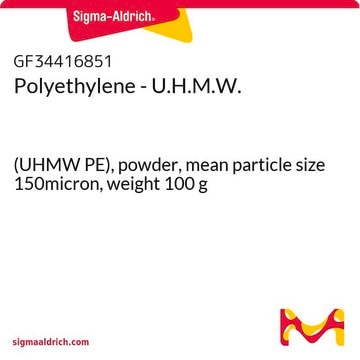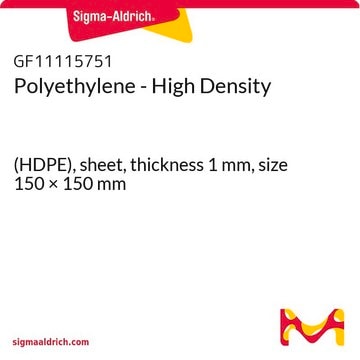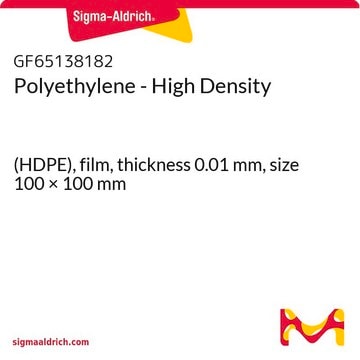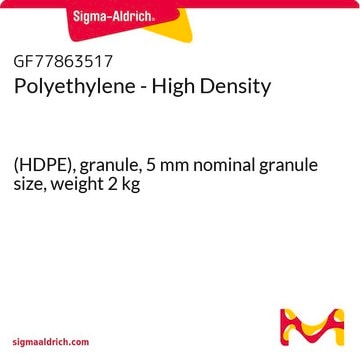547999
Polyethylene
High density, melt index 2.2 g/10 min (190 °C/2.16kg)
Sign Into View Organizational & Contract Pricing
All Photos(2)
About This Item
Linear Formula:
H(CH2CH2)nH
CAS Number:
MDL number:
UNSPSC Code:
12162002
PubChem Substance ID:
NACRES:
NA.25
Recommended Products
Quality Level
form
pellets
melt index
2.2 g/10 min (190 °C/2.16kg)
hardness
65 (Shore D, ASTM D 2240)
transition temp
softening point 123 °C (Vicat, ASTM D 1525)
density
(high density)
SMILES string
C=C
InChI
1S/C2H4/c1-2/h1-2H2
InChI key
VGGSQFUCUMXWEO-UHFFFAOYSA-N
Looking for similar products? Visit Product Comparison Guide
Application
Typical applications included specialty injection molded parts.
Features and Benefits
Excellent low temperature impact strength and environmental stress-crack resistance.
Storage Class Code
11 - Combustible Solids
WGK
WGK 3
Flash Point(F)
Not applicable
Flash Point(C)
Not applicable
Personal Protective Equipment
dust mask type N95 (US), Eyeshields, Gloves
Choose from one of the most recent versions:
Already Own This Product?
Find documentation for the products that you have recently purchased in the Document Library.
Customers Also Viewed
Łukasz Krakowxzyk et al.
Medical science monitor basic research, 19, 210-213 (2013-08-22)
The search for new surgical flap techniques and modifications of already existing ones is gaining increasing popularity. Progress in flap designing and harvesting have improved the functional and aesthetic results, especially in head and neck reconstruction. Ten pigs were used
Matteo Gumiero et al.
Food chemistry, 138(2-3), 1633-1640 (2013-02-16)
A high density polyethylene (HDPE)/calcium carbonate (CaCO(3)) film containing TiO(2) was prepared via blown film extrusion process. The photocatalytic properties of this film were evaluated by voltammetric, UV-Vis spectrophotometric and gas chromatographic measurements following the decomposition rate of suitably selected
Frederick J Kummer et al.
Journal of long-term effects of medical implants, 22(2), 177-179 (2013-02-23)
A polyethylene cup explanted after 41 years was examined using several analytical techniques to determine whether there was a material cause for the extremely low wear observed. Neither the amount of polyethylene oxidation nor crystallinity appeared to be a factor.
Katharine S Woods et al.
American journal of veterinary research, 74(4), 523-529 (2013-03-28)
To compare the diagnostic quality of bronchoalveolar lavage (BAL) fluid acquired from healthy dogs by manual aspiration via polyethylene tubing (MAPT) and via suction pump aspiration (SPA) with a suction trap connection. 12 healthy adult Beagles. BAL was performed with
Melody Yee-Man Wong et al.
Rapid communications in mass spectrometry : RCM, 27(6), 713-721 (2013-02-19)
Despite various porous materials having been widely adopted as spraying tips for direct sample analysis using electrospray ionization mass spectrometry (ESI-MS), the effect of surface property and porosity of spraying tip materials on their analytical performances is not clear. Investigation
Our team of scientists has experience in all areas of research including Life Science, Material Science, Chemical Synthesis, Chromatography, Analytical and many others.
Contact Technical Service



